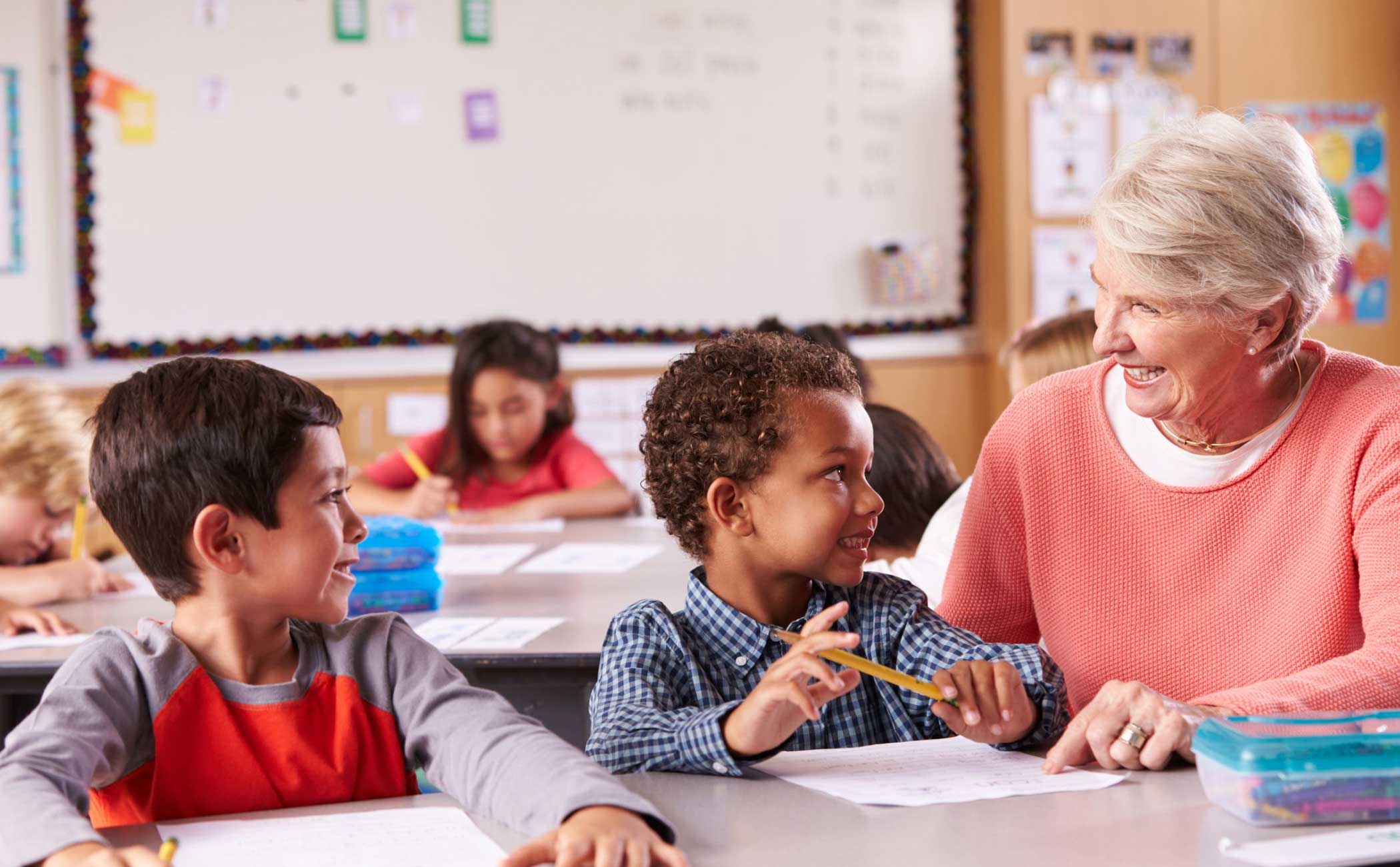
Research shows TAPP helps children, families and schools
January 22, 2024
Decades of research have shown that Teachers and Parents as Partners (TAPP) consistently improves children’s academic, social and behavioral outcomes, while building partnerships between parents and teachers. Read on to learn more about TAPP, key findings and opportunities to get involved.
About the research
TAPP is an evidence-based intervention in which parents and teachers use a problem-solving and decision-making process to build on student strengths, create a plan for success and monitor outcomes.
Researchers have studied TAPP for more than 20 years across various geographic locations, including rural and urban school settings, and specifically among Latinx students and families. Studies have included both small and large groups of school-age children, as well as children with specific challenges such as:
- Disruptive classroom behaviors (e.g., blurting out, distracting peers, etc.)
- Social skills difficulties
- Learning problems
- Off-task behaviors
- Poor academic performance
- Trouble completing work and following directions
- Arguing
- Social withdrawal
- Overactivity
- Distractibility and inattention
Visit the About page for more details on the TAPP process.
What does the research say?
The research findings are clear: the TAPP process consistently enhances children’s academic, social and behavioral outcomes.
Specifically, the findings show children whose parents and teachers participated in TAPP improved in a number of areas, including:
- Achievement and academic performance 6, 13, 16, 31
- Adaptive behaviors 21, 28, 30
- Communication skills 10, 12, 15
- On-task behaviors 27
- Homework habits and work completion 6, 13, 17, 19, 31
- Compliance 1, 12, 14, 20
- Reduced behavior problems 4, 8, 9, 12, 18, 21, 23, 25, 27, 32, 33
- Social skills 4, 5, 21, 27, 28, 30
TAPP provided the strongest evidence for producing significant positive school-related outcomes (Compared to other parent consultation models and with criteria set by the American Psychological Association Division 16.)
Parents and teachers also benefit from participating in the TAPP process. The research has demonstrated the following benefits:
Parents
- More effective parenting practices, 11, 34 including use of rewards, social skills instruction and strategies to prevent misbehavior. 27
- Decreased instances of negative or ineffective discipline. 19
- Improved problem-solving abilities. 2, 4, 7, 24
- Increased feelings of efficacy for helping their child succeed in school. 28, 34
- Improved relationships with teachers after TAPP 4, 7, 27, 28, 34 and at the three-month follow up. 19
- Improved interaction quality 3 and communication 22, 24, 34 with teachers.
- Enhanced insight into the realities teachers and schools face. 34
- Improved relationships with their child. 34
Teachers
- Increased use of positive attention and positive consequences. 29
- Greater use of appropriate behavior management strategies. 26, 29, 34
- Improved problem-solving abilities 7, 29, 34 and communication quality with parents 34 both maintained for one year after TAPP. 3
- Improved relationships with parents after TAPP 7, 21, 27 and at the three-month follow up. 19
- Improved relationships with their students. 34
- Enhanced perspective-taking and insight into students' families. 34
- Provided access to time, space and structure to support meetings with parents. 34
What's Next?
The TAPP research team, located at the University of Nebraska–Lincoln and affiliated universities and institutions, is embarking upon new research to determine how TAPP can benefit children, families and schools.
There are exciting opportunities for families, teachers and school specialists to participate in one of our current research projects. These projects will study the benefits of TAPP in rural, urban and suburban elementary school districts across the country.
Participation involves either free virtual professional development and support for educators to use TAPP in their schools, or free TAPP services delivered by project staff. In all cases, monetary compensation is provided for parents, teachers and school specialists who qualify for participation.
Interested in participating??
To secure your spot in one of our research studies for Spring 2024, please contact our team by Feb. 5, 2024.
Opportunities are also available for the 2024-25 school year. Interested school specialists, administrators, teachers and parents are welcome to reach out any time. We are happy to answer your questions about TAPP and to help you get started!
Citations
1 Bellinger, S. A., Lee, S. W., Jamison, T. R., & Reese, R. M. (2016). Conjoint behavioral consultation: Community-school collaboration and behavioral outcomes using multiple baseline. Journal of Educational and Psychological Consultation, 26(2), 139-165. https://doi.org/10.1080/10474412.2015.1089405
2 Brower, E. S., Willis, M. C., Sheridan, S. M., Witte, A. L. & Wheeler, L. A. (2022, July). Teachers and Parents as Partners: Strengthening parent-teacher relationships through consultation [Paper presentation]. Annual convention of the International School Psychologists Association, Leuven, Belgium.
3 Cheng, K. C., Witte, A. L., Wheeler, L. A., Sheridan, S. M., Gormley, M. J., Chen, D., & Eastberg, S. R. A. (2022). Examining long-term intervention effects to promote teacher problem-solving and communication skills in the rural context. School Psychology, 37(5), 378-387. https://doi.org/10.1037/spq0000512
4 Clarke, B. L., Wheeler, L. A., Sheridan, S. M., Witte, A. L., Sommerhalder, M. S., Svoboda, E. A. (2017). Supporting Latinx student success via family-school partnerships: Preliminary effects of conjoint behavioral consultation on student and parent outcomes. Journal of Educational & Psychological Consultation, 27(3), 317-343. https://doi.org/10.1080/10474412.2017.1293543
5 Colton, D. L., & Sheridan, S. M. (1998). Conjoint behavioral consultation and social skills training: Enhancing the play behaviors of boys with attention deficit hyperactivity disorder. Journal of Educational & Psychological Consultation, 9(1), 3-28. https://doi.org/10.1207/s1532768xjepc0901_1
6 Galloway, J., & Sheridan, S. M. (1994). Implementing scientific practices through case studies: Examples using home-school interventions and consultation. Journal of School Psychology, 32(4), 385-413. https://doi.org/10.1016/0022-4405(94)90035-3
7 Garbacz, S. A. & McIntyre, L. L. (2016). Conjoint behavioral consultation for children with autism spectrum disorder. School Psychology Quarterly, 31(4), 450-466. https://doi.org/10.1037/spq0000114
8 Garbacz, S. A., Watkins, N. D., Diaz, Y., Barnabas, E. R., Jr., Schwartz, B., & Eiraldi, R. (2017). Using conjoint behavioral consultation to implement evidence-based practices for students in lowincome urban schools. Preventing School Failure: Alternative Education for Children and Youth, 61(3), 198-210. https://doi.org/10.1080/1045988x.2016.1261078
9 Gormley, M. J., Sheridan, S. M., Dizona, P. J., Witte, A. L., Wheeler, L. A., Eastberg, S. R. A.; Cheng, K.C. (2020). Conjoint behavioral consultation for students exhibiting symptoms of ADHD: Effects at post-treatment and one-year follow up. School Mental Health, 12(1), 53-66. http://dx.doi.org/10.1007/s12310-019-09342-0
10 Gortmaker, V., Warnes, E. D., & Sheridan, S. M. (2004). Conjoint behavioral consultation: Involving parents and teachers in the treatment of a child with selective mutism. Proven Practice, 5(2), 66-72. http://digitalcommons.unl.edu/edpsychpapers/206
11 Illsley, S. D., & Sladeczek, I. E. (2001). Conjoint behavioral consultation: Outcome measures beyond the client level. Journal of Educational & Psychological Consultation, 12(4), 397-404. https://doi.org/10.1207/S1532768XJEPC1204_06
12 Kahveci, G., & Ataman, A. (2017). The effect of conjoint behavioral consultation program related teaching on problem behavior and communication/social skills with a blind and autistic child. Journal of Education and Learning, 6(4), 372-384. https://doi.org/10.5539/jel.v6n4p372
13 Kahveci, G. & Bulut-Serin, N. (2017). Conjoint behavioral consultation, cognitive behavior therapy and schema-based instruction: Enhancing mathematical resilience. EURASIA Journal of Mathematics Science and Technology Education, 13(8), 5543-5556. https://doi.org/10.12973/eurasia.2017.00850a
14 Lasecki, K., Olympia, D., Clark, E., Jenson, W., & Heathfield, L. T. (2008). Using behavioral interventions to assist children with Type 1 diabetes manage blood glucose levels. School Psychology Quarterly, 23(3), 389-406. https://doi.org/10.1037/1045-3830.23.3.389
15 Mitchell, A. D., & Kratochwill, T. R. (2013). Treatment of selective mutism: Applications in the clinic and school through conjoint consultation. Journal of Educational and Psychological Consultation, 23(1), 36-62. https://doi.org/10.1080/10474412.2013.757151
16 Murray, D. W., Rabiner, D., Schulte A., & Newitt, K. (2008). Feasibility and integrity of a parent-teacher consultation intervention for ADHD students. Child Youth Care Forum, 37(3), 111-126. https://doi.org/10.1007/s10566-008-9054-6
17 Ohmstede, T. J., & Yetter, G. (2015). Implementing conjoint behavioral consultation for African American children from a low-SES, urban setting. Journal of Educational and Psychological Consultation, 25(1), 18-54. https://doi.org/10.1080/02796015.2005.12086277
18 Owens, J. S., Murphy, C. E., Richerson, L., Girio, E. L., & Himawan, L. K. (2008). Science to practice in underserved communities: The effectiveness of school mental health programming. Journal of Clinical Child & Adolescent Psychology, 37(2), 434-447. https://doi.org/10.1080/15374410801955912
19 Power, T. J., Mautone, J. A., Soffer, S. L., Clarke, A. T., Marshall, S. A., Sharman, J., Blum, N. J., Glanzman, M., Elia, J., & Jawad, A. F. (2012). A family–school intervention for children with ADHD: Results of a randomized clinical trial. Journal of Consulting and Clinical Psychology, 80(4), 611-23. https://doi.org/10.1037/a0028188
20 Ray, K. P., Skinner, C. H., & Watson, T. S. (1999). Transferring stimulus control via momentum to increase compliance in a student with autism: A demonstration of collaborative consultation. School Psychology Review, 28(4), 622-628. https://doi.org/10.1080/02796015.1999.12085990
21 Sheridan, S. M., Bovaird, J. A., Glover, T. A., Garbacz, S. A., Witte, A., & Kwon, K. (2012). A randomized trial examining the effects of conjoint behavioral consultation and the mediating role of the parent-teacher relationship. School Psychology Review, 41(1), 23-46. https://doi.org/10.1080/02796015.2012.12087374
22 Sheridan, S. M., Clarke, B. L., Knoche, L., & Edwards, C. P. (2006). The effects of conjoint behavioral consultation in early childhood settings. Early Education and Development, 17(4), 593-617. https://doi.org/10.1207/s15566935eed1704_5
23 Sheridan, S. M., Kratochwill, T. R., & Elliott, S. N. (1990). Behavioral consultation with parents and teachers: Delivering treatment for socially withdrawn children at home and school. School Psychology Review, 19(1), 33-52. https://doi.org/10.1080/02796015.1990.12087337
24 Sheridan, S. M., Ryoo, J. H., Garbacz, S. A., Kunz, G. M., & Chumney, F. L. (2013). The efficacy of conjoint behavioral consultation on parents and children in the home setting: Results of a randomized controlled trial. Journal of School Psychology, 51(6), 717-733. https://doi.org/10.1016/j.jsp.2013.09.003
25 Sheridan, S. M., Warnes, E. D., Cowan, R. J., Schemm, A. V., & Clarke, B. L. (2004). Family-centered positive psychology: Focusing on strengths to build student success. Psychology in the Schools, 41(1), 7-17. https://doi.org/10.1002/pits.10134
26 Sheridan, S. M., Wheeler, L. A., Brower, E. S., Clarke, B., Witte, A. L., Gormley, M., Prokasky, A., & Lee, S. (2023). Conjoint behavioral consultation and students of Latiné origin: Effects on social and behavioral outcomes at school and home. Manuscript submitted for publication.
27 Sheridan, S. M., Witte, A. L., Holmes, S. R., Coutts, M. J., Dent, A. L., Kunz, G. M., & Wu, C. (2017). A randomized trial examining the effects of Conjoint Behavioral Consultation in rural schools: Student outcomes and the mediating role of the parent-teacher relationship. Journal of School Psychology, 61, 33-53. https://doi.org/10.1016/j.jsp.2016.12.002
28 Sheridan, S. M., Witte, A. L., Holmes, S. R., Wu., C., Bhatia, S. A., & Angell, S. R. (2017). The efficacy of conjoint behavioral consultation in the home setting: Outcomes and mechanisms in rural communities. Journal of School Psychology, 62, 81-101. https://doi.org/10.1016/j.jsp.2017.03.005
29 Sheridan, S. M., Witte, A. L., Kunz, G. M., Wheeler, L. A., Angell, S. R., & Lester, H. F. (2018). Rural teacher practices and partnerships to address behavioral challenges: The efficacy and mechanisms of conjoint behavioral consultation. The Elementary School Journal, 119(1), 99-121. https://doi.org/10.1086/698694
30 Sheridan, S. M., Witte, A. L., Wheeler, L. A., Eastberg, S. R. A., Dizona, P. J., & Gormley, M. J. (2019). Conjoint behavioral consultation in rural schools: Do student effects maintain after 1 year? School Psychology, 34(4), 410-420. https://doi.org/10.1037/spq0000279
31 Weiner, R. K., Sheridan, S. M., & Jenson, W. R. (1998). The effects of conjoint behavioral consultation and a structured homework program on math completion and accuracy in junior high students. School Psychology Quarterly, 13(4), 281-309. https://doi.org/10.1037/h0088986
32 Wilkinson, L. A. (2005). Bridging the research-to-practice gap in school-based consultation: An example using case studies. Journal of Educational and Psychological Consultation, 16(3), 175-200. https://doi.org/10.1207/s1532768xjepc1603_3
33 Witte, A. L., Schumacher, R. E., & Sheridan, S. M. (2022). The effectiveness of technology-delivered conjoint behavioral consultation: Addressing rural student and family needs. Journal of Educational and Psychological Consultation, 33(3), 254-279. https://doi.org/10.1080/10474412.2022.2083624
34 Focus groups with parents and teachers of Latiné K-5 students

